 |
| Download pdf file | Newsletter archives | |||
| Dieser Newsletter auf Deutsch | Cette newsletter en français | |||
1. European Commission refuses legislative initiatives |
 |
|
No plans to revise EWC Directive
Full text of European Commission's report Working document with detailed evaluation Full text of the evaluation study
The European Commission identifies as a central problem, the fact that there is neither a (minimum) list of information which must be communicated to EWC members, nor any timing defined for the processing of an information and consultation procedure. Also the meaning of the EWC's opinion is imprecise and its influence on management decisions too weak. The interpretation of the term "transnational matters" frequently poses problems in practice. However, despite these findings, the European Commission does not wish to modify the Directive in any way, as requested by the European Trade Union Confederation in March 2017 (see report in EWC News 1/2017). It has however published three concrete suggestions and plans:
The principal findings of the study
The evaluation concentrated exclusively on examining the 2009 recast EWC Directive in comparison with the old Directive. It was based on a previous evaluation from 2008 (see report in EWC News 3/2008). The findings of the current study are as follows:
The question of sanctions
This statement from the European Commission is the most sensitive point in the whole report and highlights the differences between individual countries. The maximum fine ranges from 890 € in Romania to 15,000 € in Germany and up to 222,219 € in Ireland. In four countries there are also provisions for possible imprisonment, in France for up to one year and in Germany up to two. Hungary on the other hand has completely removed all sanctions from its EWC legislation.
The European Commission has assigned itself a task which could prove much more relevant than any inconspicuous amendment to legislation. It wants to support member states in their effort to improve the implementation of the Directive "in particular with regard to the organization of effective, proportionate and dissuasive sanctions in the case of infringements against the Directive's regulations." Even BusinessEurope, the European umbrella organization of employers' associations has shown its willingness. In its position paper from February 2017 it states in point 22:
Full text of BusinessEurope position paper
Forthcoming event
This issues will be on the agenda at the 11th Hamburg conference of the EWC Academy on 28 and 29 January 2019.
Trade union federation starts court proceedings against the European Commission
On 5 March 2018, the European Commission announced that it would not start a legislative procedure on this topic. In the opinion of the trade unions, this violates the Treaty on the Functioning of the European Union. This states that any agreements concluded by the social partners at the European level may be transposed into an EU Directive upon request of both bargaining parties. The EU Treaty assumes that the bargaining parties are able to develop better solutions together with one another than those from the bureaucrats in Brussels. The legal proceedings will now deal precisely with this question. Beyond the actual case it is therefore of fundamental importance for the whole of EU labour law. As such the exact wording of the recast EWC Directive was negotiated by the social partners themselves in the summer 2008 (see report in EWC News 3/2008).
Trade union response to European Commission´s position EPSU press release on court filing Full text of the social partners' agreement |
 |
2. Company transfers made easier |
 |
|
Plans to safeguard employee rights
New field of activity for European works councils
In the future, every company setting up business in another EU country must provide a report on the economic motives and consequences of the transformation. It must describe the overall effects of the reorganization and specifically on employees in more detail. Employee representatives (including the European works council, if present) have up to two months to render an opinion on this report which must be taken into consideration during the company´s general shareholders meeting. Local authorities may consult the report if there are doubts on the consequences of a company´ departure.
In principle, the laws of the EU country to which the company has relocated apply. However, if there is less codetermination in the supervisory board than in the country of origin, then a Special Negotiating Body (SNB) has to be established to negotiate the modalities of board-level employee participation. If no agreement is reached within four months then the same minimum standards as for a SE conversion are to apply. For any subsequent, further restructuring the original supervisory board codetermination rights must be maintained for at least three years. The regulations for cross-border mergers are not touched (see report in EWC News 4/2017).
The two Directives are to be adopted before May 2019 and will enter into force two years later. The European Parliament will now deal with the proposals where the trade unions are expecting to see some improvements. In the past Members of the European Parliament have frequently raised social demands, reaching far beyond the proposals of the European Commission (see report in EWC News 3/2013).
European Commission press release FAQs on the two draft Directives Full text of draft Directive on employee participation Critical report on the legislative initiative Report from a trade union meeting in Brussels
European Court of Justice allows pure letterbox companies
Polbud has its headquarters in Łąck, a village on the Vistula river half way between Warsaw and Toruń. In 2011, the owners of this concrete and construction company had decided to relocate their headquarters to Luxembourg which then took place in 2013. However the Polish commercial register refused to remove the company. Legal proceedings were consequently initiated before the Bydgoszcz district court, on which the European Court of Justice has now passed a ruling.
Figures on avoidance of codetermination |
 |
3. Judges in Vienna contradict London judges |
 |
|
Long awaited EWC court ruling - in vain
The judges did not examine Austrian EWC legislation, but merely the company´s "voluntary" EWC agreement, which was concluded in 1995 and revised in 2004. In the court´s opinion, it is not hereby evident whether the contracting parties wished to explicitly exclude video conferences as a replacement for extraordinary EWC meetings (see report in EWC News 2/2017). In February 2018, the Central Arbitration Committee in London had ruled in a completely different manner on this question, although this involved a "default" EWC and not a EWC agreement (see report in EWC News 1/2018).
There was also a further issue that the Mayr-Melnhof Packaging EWC was unable to resolve itself. In the EWC agreement the judges could not recognize that only the managing director could be considered as the EWC´s interlocutor and not also subordinate management levels. The third issue, of whether the acquisition of factories is an exceptional circumstance in the sense of EWC law, was in the context, no longer explicitly covered in the proceedings.
An appeal is not possible in practice
In reaction to the court action, central management had already given notice for terminating the EWC agreement on 29 June 2016. It was terminated according to schedule at the end of 2017. The court ruling which the EWC had been awaiting for nearly two years, has consequently no longer any practical relevance for its work. This is precisely the reason why an appeal would be pointless. Since 1 January 2018, the EWC has been operating "by law" without a EWC agreement. It therefore now falls completely under the new EU Directive. Should it again come to similar disputes in the future, a completely new legal proceedings would have to be started, which would exclusively concern the interpretation of the current EU legal situation.
This example clearly demonstrates how weak the legal basis of a "voluntary" EWC agreement is and which according to article 14, is not subject to the EWC Directive. This still concerns more than one third of all European works councils. In the case of Hewlett-Packard, the US IT group, it even resulted in the dissolution of the EWC (see report in EWC News 1/2014). Due to the fragmentation of the group into several successor companies, there has still been no new EWC established until today (see report in EWC News 1/2017).
Forthcoming event
The contentious issues of this court case are relevant for many European works councils and will be covered in our legal workshop to be held from 23 to 26 October 2018 in Berlin.
|
 |
4. Further court rulings with transnational relevance |
 |
|
French central works council granted access to confidential business figures
In court, French management claimed that the required documents could only be consulted at the group´s headquarters. Hence, the court proceedings could only be filed in the Netherlands. The court rejected this argument and obliged the company to communicate all of the requested documents within 30 days: the exact schedule for the takeover bid, the list of other potential buyers, the reasons behind the choice of Thales and the effects of the takeover project on restructuring and their plans for safeguarding employment. Since the works councils had not yet received any documents, the information and consultation procedure could not begin. For the time being, in this situation the acquisition cannot proceed under French jurisdiction (see report in EWC News 1/2008). At present the workforce in France is to be reduced by 10%.
Report and full text of the court ruling
Swiss technology group refuses pan-German works council
The legal case began when four works councils wanted to establish a National works council in 2014. However, in the opinion of the highest German labour court judges, this is only possible if there is significant power for decision-making at the head of the German subsidiary. The codetermination of works councils should take place where the business decisions are made, with a management representative who has the power to conclude binding agreements for the subordinate companies. There is no possibility of establishing a European works council for Feintool International since Germany is the only country within the single market having more than 150 employees, the threshold of the EWC Directive.
German labour court pushes responsibility onto Ireland
CSC had merged with the IT outsourcing division of the US Company HPE (Hewlett-Packard Enterprise) in April 2017. The new company, operating under the name DXC Technology, has 160,000 employees worldwide and wants to negotiate a European works council under Irish jurisdiction. Following the dissolution of Hewlett-Packard´s EWC in January 2014, the successor company HPE has not yet succeeded in establishing its own EWC (see report in EWC News 1/2017). Since this merger represents a change in structure in the sense of article 13 of the EWC Directive, a Special Negotiating Body was established, which has three years to negotiate a new EWC agreement for DXC Technology. However, the existing CSC European works council remains in office until the new EWC for DXC Technology has become operational. On 7 March 2018, central management announced that it would not organize any further meetings of CSC´s European works council, which is a clear breach of law. In the meantime the legal case has come before the Hessen regional labour courts.
Forthcoming event
|
 |
5. Restructuring ahead for German energy groups |
 |
|
Several SE works councils concerned
Although 5,000 jobs are at stake, German trade unions have not rejected these plans, because potential foreign investors will be consequently kept at bay and the two groups will continue to exist with secured employee participation structures. A scenario such as in the merger of the gas manufacturers Linde and Praxair in June 2017 (see report in EWC News 2/2017) can be avoided. On 27 April 2018, E.ON presented the official takeover offer and the SE works council of innogy rendered its opinion on 9 May 2018. The management of E.ON, innogy and RWE, came to an agreement already on 11 May 2018 upon a Declaration of Principles with the works councils and trade unions. This includes a guarantee for no compulsory redundancies, the preservation of existing collective agreements and full-parity codetermination. However it applies only to Germany.
Background report from union perspective Works councils´ opinion (from page 106 on) Press release on Declaration of Principle
In the German energy industry there only remain European works councils in groups with a foreign parent company. The large companies once based in Germany have long since moved away into the European Company (SE) legal form. SE works councils and SE supervisory boards are consequently very common, also in individual subsidiaries (see report in EWC News 2/2009). There are however qualitative differences. As such, RWE belongs to the participation-friendly cases of SE agreements (see report in EWC News 4/2013). innogy has a SE supervisory board with 20 members (including ten employee representatives), while E.ON had reduced the supervisory board from 20 to twelve members in the course of its SE conversion (see report in EWC News 4/2012). According to the trade unions the acquisition of innogy should be reflected in the E.ON supervisory board.
The electrical engineer Uwe Tigges (photo) was appointed the new CEO of innogy at the annual shareholders meeting held on 24 April 2018. He had already temporarily taken this office on 19 December 2017. During the period from 2004 to 2012 he was the chairman of RWE´s European works council and had concluded a milestone agreement on socially responsible restructuring (see report in EWC News 1/2007). He subsequently took office as executive director of labour relations at RWE and later at innogy. Arno Hahn, who was the works council chairman for many years at the RWE Bad Kreuznach site, was his successor as labour relations´ director.
Curriculum vitae of Uwe Tigges |
 |
6. Board-level participation with and without SE works council |
 |
|
Co-determined supervisory board in parallel with SE administrative board
The SE & Co. KGaA legal form is increasingly used by family businesses in actual fact to side-step supervisory board-level participation which is mandatory in a SE conversion. Employee representatives are kept well away from any strategic decisions. In Ottobock, for the partnership limited by shares (KGaA), there is one European-level supervisory board with six shareholder and four employee representatives and a further administrative board running alongside it for Ottobock Management SE, however without employee representatives. No SE works council has been established since the SE does not have any employees. The conversion took place according to the EU Mergers Directive and the participation agreement was signed by the Special Negotiating Body, on 6 November 2016.
The EU Merger Directive is still relatively seldom used and was most recently by the Austrian group RHI in October 2017 (see report in EWC News 4/2017). It regulates codetermination in the supervisory board but does not address the topic of works councils. As a result Ottobock falls under the "normal" EWC Directive. This requires however that the works councils in two countries take the initiative to begin the procedure for establishing the EWC.
Report on supervisory board´s constituent meeting Organizational chart of the new corporate governance structure Full text of the EU Merger Directive
Online delivery service on the road to full-parity codetermination
The future SE works council is elected strictly according to the minimum provisions of the SE Directive. One seat is attributed to each country in the single market and additional seats if the country has more than 10% of the European workforce. Since there are, up to now, hardly any works councils within the delivery company there will be general elections for the entire workforce organized electronically in the respective countries. The SE works council meets once per year for their plenary meeting which is chaired by the employer. A second annual meeting is organized as a video- or tele-conference. In exceptional circumstances there are only provisions for a virtual meeting unless central management approves a face-to-face meeting. This regulation deviates from the SE Directive´s requirements, which does not incorporate the amendments to legislation on video-conferences in force since October 2017 (see report in EWC News 2/2017). The SE works council is competent whenever more than 10% of a country´s workforce (at least 50 employees) is affected by any measures. A fixed deadline for the duration of a consultation procedure has not been defined.
Court order changes the entire negotiation situation
The Special Negotiating Body was constituted in October 2017 and was only allowed to negotiate on the SE works council, not on any codetermination in the supervisory board. Through the SE conversion, central management wanted permanently keep the supervisory board free from any employee representation. However, in a so-called "Status procedure" on 9 March 2018, the regional court in Berlin ruled Delivery Hero to be subject to German codetermination law. The SE remains therefore with full-parity codetermination and the supervisory board has just been reduced in size from twelve to six seats. The three future employee representatives are elected by the SE works council.
Since April 2017, the Tom Tailor textile chain also has a full-parity SE supervisory board following a status procedure started by the works council (see report in EWC News 2/2017). However, for Delivery Hero the status procedure has not been submitted by employee representatives but by a minority shareholder. This was the same plaintiff who was unsuccessful in overturning a ruling on German codetermination before the European Court of Justice for infringements against European law in July 2017 (see report in EWC News 3/2017).
Report on ruling of the regional court Berlin Report on the negotiation procedure Company press release on SE conversion EFFAT union federation press release Report on the first works council election
French IT group converts German subsidiary into SE
Only Germany and Austria are currently represented in the SE works council, which elects a chairman and vice-chairman. Meetings take place twice annually. The SE works council has a deadline of six weeks to render its opinion in the case of restructuring. If this is not taken into consideration by central management, then there is a further meeting with the SE works council aimed at reaching an agreement. A full-parity arbitration board with a neutral chairman is established to settle any disputes arising on the interpretation of the SE agreement. Everything else is based on the subsidiary requirements of the SE Directive. There is currently no European works council.
Supervisory board between one-third and full-parity participation
The future supervisory board is composed of five members including two employee representatives. If the company grows in size to over 3,000 employees, then the supervisory board also gradually increases in size. However, it is limited to a maximum of nine members including four employee representatives who are all elected by the SE works council. The distribution of mandates infringes a regulation of the German SE participation law, according to which, the number of seats on the supervisory board must be divisible by three. In 2010 however, the regional court in Nuremberg had ruled that a derogation from the law is hereby possible (see report in EWC News 1/2010). |
 |
7. Newly established European works councils |
 |
|
German mechanical engineering group with EWC experience
The EWC agreement is closely tailored around the provisions for the previous parent company GEA, which were last updated in August 2011 and surpass the requirements of German EWC legislation (see report in EWC News 3/2011). This includes a very extensive definition of the EWC´s competence in restructuring, even when only one country is concerned. EWC members may meet with the employee representatives of involved countries at any time during an on-going consultation procedure and hold talks locally. There is no fixed deadline for rendering an opinion.
The 16 representatives from ten countries (including four from Germany) elect a steering committee made up of five permanent members and one additional rotating annually. In exceptional circumstances the committee receives detailed and comprehensive information and may request an extraordinary EWC meeting at any time. The annual ordinary plenary meeting is always extended to include a one-day training. All representatives may in addition participate in external seminars. The EWC can establish working and project groups and individual product groups hold a meeting once annually. Besides a permanent trade union coordinator the EWC may also commission paid experts as is necessary.
Japanese automobile supplier surpasses German EWC standards
The EWC meets twice annually in different sites. Once per year, guest representatives from Slovenia and six non-EU countries are invited (Serbia, Turkey, Russia, Ukraine, Morocco and Tunisia). A general assembly is held in countries without employee representatives enabling the workforce to appoint representatives to participate in the EWC. In order to avoid by-elections during the current term of office, three substitute members are appointed for each representative. If there is need to adopt a resolution between regular meetings, an extraordinary meeting is held within three weeks upon request. The EWC has a right of access to all sites.
The five members of the steering committee may meet at any time as they deem necessary. They may freely choose the venue and duration of this meeting without prior approval from the employer. The EWC may establish working groups and commission experts of its own choice, and a lawyer in the case of legal proceedings. Central management informs the EWC on the topics at hand in writing three weeks prior to any meeting. Each representatives may then discuss the topic with his country works councils, with the exception of issues which have been declared as strictly confidential. The consultation procedure is concluded when the EWC has rendered its opinion which must be communicated within a period of five weeks following the meeting.
Manufacturer of Dental products uses German EWC law
The new EWC has 16 members and represents 6,800 employees in 20 countries, whereby most of these only have a few sales employees. The largest countries are Germany with 3,700 employees (four seats) and Sweden with 1,000 employees (two seats). The EWC meets once per year and elects a steering committee of five members from at least three different countries. These meet twice per year, alternating between the Rhine-Main region and another venue abroad. Whereas the plenary meetings have simultaneously interpretation, the steering committee meetings are conducted only in English.
The EWC is competent for matters which concern at least 150 employees in two countries. In exceptional circumstances (restructuring) the threshold lies at 75 employees or 10% of the workforce in one country. The EWC must render its opinion within four weeks following the written information by central management. The response from central management within a further three weeks terminates the consultation procedure. Such extraordinary meetings are usually held via videoconference, providing that the elected EWC chairman has not expressly convened a physical meeting. The EWC´s right to training is somewhat less favorably regulated than in the German EWC legislation. In addition to a permanent trade union official the EWC may also commission a paid expert.
Report on the first works council meeting following the merger |
 |
8. Pan-European company agreements |
 |
|
Recognition of works council activity as a professional qualification
So far, such an agreement has already existed for the Solvay sites in France. The new charter now describes guiding principles for all of the nine countries where the EWC is represented. National implementation plans are to be compiled by the end of 2018. In each country a working group is to be established made up of the employer and the works council which may call upon an external consultant. It identifies the goals, duties and activities for each mandate. Afterwards the skills of all employee representatives are evaluated individually, in order to review their professional and personal career development strategy - including also the period following office. The individual skills are evaluated in three levels: in progress; fully proficient; able to pass on skills. Participation in the evaluation is on a voluntary basis. Several transnational company agreements have already been concluded for Solvay. The most recent was in March 2016, on profit-sharing for the entire workforce around the globe (see report in EWC News 2/2016).
US dairy group commits to diversity and equal treatment policy
In order to embody the goals of equal treatment policies within the company, there will be training courses organized on both European and national levels. Local employee representatives will be involved in the implementation in each case. An assessment will be carried out by the European works council, which was first established in November 2016 (see report in EWC News 4/2016).
|
 |
9. The view beyond Europe |
 |
|
On the road to a World works council
Report on the network´s meeting
World´s second largest energy group reinforces social standards
Apart from the safeguarding of fundamental social rights, the company commits to fiscal transparency, to combat corruption, fraud and harassment in the workplace, to exercise due diligence for suppliers and subcontractors, to promote gender equality and to combat discrimination. In cooperation with employee representatives, EdF wishes to offer employees appropriate professional training and to further develop their skills. The agreement is very comprehensive and will probably serve as reference text for other companies in the coming years.
|
 |
10. Interesting websites |
 |
|
International study about Crowd Work
Government Information on pay transparency
Brexit Check from an employee perspective
Consequences of the Brexit for European works councils |
 |
11. New publications |
 |
|
Legal commentary on SE negotiations
In May 2018, the European Center for Workers´ Questions (EZA), a network of Christian-social workers´ organizations from 30 countries, published a report on the digitalization of the working world. It presents the most important developments (Big Data, Sharing Economy, Crowdworking), describes the current state of research on the possible effects on employment and provides recommendations for employee organizations´ policy-making. The scientific analysis was specially enriched with the practical experience of participants from different countries. Five seminars were organized for this purpose in: Portugal, Austria, Hungary, Italy and Malta. The project report is available in four languages.
Project description and download of all language versions
An Atlas of work was published for the first time in May 2018. It was edited by the Hans-Böckler Foundation and the German Confederation of Trade Unions (DGB) in German and English. It presents the differences in income, wage bargaining policies and the trade union landscape throughout Germany, as well as examining the development of unemployment (in all German Federal Länder), the flexible employment relationships and the digitalization of the German economy. A section on the EU examines migration within European single market and the collective bargaining coverage in individual countries. It also provides a direct comparison between Germany and France (page 46f). Amongst other topics, the section on the world deals with the industrialization of Southeast Asia and the supply chain in the textile industry.
Pushing for stronger global social dialogue
Press release on the presentation of the report |
 |
12. The EWC Academy: Examples of our work |
 |
|
Searching for EWC candidates in Hungary
Report on labour relations in Hungary
Full text of proposals for the new code New guidelines on employee participation (see points 26 to 36)
EWC training for US company based in Ireland
Cooperation and social partnership in Japanese company |
 |
13. Current seminar schedule |
 |
|
New seminar catalogue
The EWC Academy has taken the opportunity of the recently concluded works council elections in Germany to publish for the first time a Seminar Catalogue. It presents the forthcoming events on 64 pages.
Overview of forthcoming seminar schedule Scroll online through the seminar catalogue Seminar catalogue for Download
EWC and SE seminars in Montabaur Castle
Report of this seminar from 2012
Seminar and EWC conference in Rome
French-German works council conference in Paris
Report on a previous works council conference in Paris
In-house events
|
 |
14. Imprint |
 |
|
EWC-News is published by: You can obtain or cancel EWC News here.
|
 |
 The European Commission was due to publish a report on the implementation of the 2009 recast EWC Directive, by 5 June 2016 at the latest - in exact accordance with the requirements of article 15 of this Directive. The report was finally published on 14 May 2018, almost two years late. It is based on an empirical evaluation, in which the EWC Academy had also participated (see
The European Commission was due to publish a report on the implementation of the 2009 recast EWC Directive, by 5 June 2016 at the latest - in exact accordance with the requirements of article 15 of this Directive. The report was finally published on 14 May 2018, almost two years late. It is based on an empirical evaluation, in which the EWC Academy had also participated (see 
 On 15 May 2018, the European Federation of Public Service Unions (EPSU) filed a case before the European Court of Justice in Luxembourg. 9.8 million employees in government authorities within EU Member States continue to be excluded from any rights of information and consultation in the workplace. This is also the case for transfer of undertakings and mass redundancies, e.g. in connection with privatizations. In order to plug this gap in the law, several trade unions concluded a social partners´ agreement on 21 December 2015 with the association of European Public Administration Employers (EUPAE) and demanded its transposition into an EU Directive.
On 15 May 2018, the European Federation of Public Service Unions (EPSU) filed a case before the European Court of Justice in Luxembourg. 9.8 million employees in government authorities within EU Member States continue to be excluded from any rights of information and consultation in the workplace. This is also the case for transfer of undertakings and mass redundancies, e.g. in connection with privatizations. In order to plug this gap in the law, several trade unions concluded a social partners´ agreement on 21 December 2015 with the association of European Public Administration Employers (EUPAE) and demanded its transposition into an EU Directive.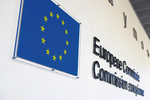 On 25 April 2018, the European Commission published proposals for two Directives on the transnational mobility of companies, the "Company Mobility Package". It aims to facilitate cross-border transfers, mergers or divisions of companies within the single market and to enable companies to be founded and registered online. Critics fear an increase in "regime shopping" with a rush to tax havens, lower social standards and an escape from codetermination. The Directives are to include protective regulations to combat such abuse and the use of "fake companies".
On 25 April 2018, the European Commission published proposals for two Directives on the transnational mobility of companies, the "Company Mobility Package". It aims to facilitate cross-border transfers, mergers or divisions of companies within the single market and to enable companies to be founded and registered online. Critics fear an increase in "regime shopping" with a rush to tax havens, lower social standards and an escape from codetermination. The Directives are to include protective regulations to combat such abuse and the use of "fake companies". The draft Directives are connected to the "Polbud ruling" of the European Court of Justice from 25 October 2017. In the opinion of the judges, every company should be free to choose the country in which it has its headquarters. The principle of free establishment in the single market also includes the transfer of a company´s (legal) seat to another EU country without the relocation of any business activity or administration. According to company lawyers this opens up "unimaginable possibilities", whereas union-related commentators expect effects on codetermination to be "devastating".
The draft Directives are connected to the "Polbud ruling" of the European Court of Justice from 25 October 2017. In the opinion of the judges, every company should be free to choose the country in which it has its headquarters. The principle of free establishment in the single market also includes the transfer of a company´s (legal) seat to another EU country without the relocation of any business activity or administration. According to company lawyers this opens up "unimaginable possibilities", whereas union-related commentators expect effects on codetermination to be "devastating". The courts in Austria ruled for the first time on a EWC matter, on 30 April 2018. The labour and social court of first instance in Vienna rejected a claim which was filed by the European works council of Mayr-Melnhof Packaging on 1 June of 2016, for violation of its information and consultation rights. The cardboard manufacturer´s central management had only offered a video conference instead of a correct consultation procedure. For years, the employee representatives have been complaining that they are not sufficiently consulted (see
The courts in Austria ruled for the first time on a EWC matter, on 30 April 2018. The labour and social court of first instance in Vienna rejected a claim which was filed by the European works council of Mayr-Melnhof Packaging on 1 June of 2016, for violation of its information and consultation rights. The cardboard manufacturer´s central management had only offered a video conference instead of a correct consultation procedure. For years, the employee representatives have been complaining that they are not sufficiently consulted (see  Constitutional meeting of the "default" EWC
Constitutional meeting of the "default" EWC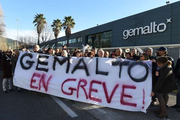 On 22 March 2018, the regional court in the Paris suburb Nanterre granted the claim of Gemalto´s central works council, demanding the communication of documents on its announced acquisition by the French electronics group Thales and which hitherto had been kept secret. On 17 December 2017, Thales had announced its acquisition of the Dutch smart-card manufacturer Gemalto, before autumn 2018. The French state still holds a 26% share in Thales which has 64,000 employees worldwide. Gemalto, with 15,000 employees, is owned by US financial investors and the German family of industrialists, Quandt, who also holds a significant shareholding in BMW.
On 22 March 2018, the regional court in the Paris suburb Nanterre granted the claim of Gemalto´s central works council, demanding the communication of documents on its announced acquisition by the French electronics group Thales and which hitherto had been kept secret. On 17 December 2017, Thales had announced its acquisition of the Dutch smart-card manufacturer Gemalto, before autumn 2018. The French state still holds a 26% share in Thales which has 64,000 employees worldwide. Gemalto, with 15,000 employees, is owned by US financial investors and the German family of industrialists, Quandt, who also holds a significant shareholding in BMW. The Federal Labour Court in Erfurt ruled on 23 May 2018 that the German subsidiaries of Feintool International are not allowed to establish a Group works council. This metalworking company from the Swiss canton of Berne which has 2,400 employees worldwide, is a system supplier to the automobile industry and has acquired small specialized manufacturing plants in Germany in recent years. These are administered through a German financial holding, which neither has employees nor takes any management decisions. All the sites in Germany are directly managed from Switzerland.
The Federal Labour Court in Erfurt ruled on 23 May 2018 that the German subsidiaries of Feintool International are not allowed to establish a Group works council. This metalworking company from the Swiss canton of Berne which has 2,400 employees worldwide, is a system supplier to the automobile industry and has acquired small specialized manufacturing plants in Germany in recent years. These are administered through a German financial holding, which neither has employees nor takes any management decisions. All the sites in Germany are directly managed from Switzerland. On 13 June 2018, the labour court in Wiesbaden rejected an application for an injunction order from the European works council of Computer Sciences Corporation (CSC) for the convening of a EWC meeting. The labour court ruled that it was not competent for the case, although the US group´s EWC agreement, which was first concluded in 2000, lies under German jurisdiction and the Wiesbaden subsidiary was chosen as the headquarters for central management.
On 13 June 2018, the labour court in Wiesbaden rejected an application for an injunction order from the European works council of Computer Sciences Corporation (CSC) for the convening of a EWC meeting. The labour court ruled that it was not competent for the case, although the US group´s EWC agreement, which was first concluded in 2000, lies under German jurisdiction and the Wiesbaden subsidiary was chosen as the headquarters for central management. On 11 March 2018, the two energy companies E.ON and RWE announced a restructuring of their activities. E.ON plans to focus itself on the electricity distribution grid and RWE on power generation. To this end, RWE is to sell its subsidiary innogy with 42,000 employees to E.ON and will acquire all renewable energies in return. RWE would then be the third largest green-energy producer in Europe. The transaction should be finalized by 2020.
On 11 March 2018, the two energy companies E.ON and RWE announced a restructuring of their activities. E.ON plans to focus itself on the electricity distribution grid and RWE on power generation. To this end, RWE is to sell its subsidiary innogy with 42,000 employees to E.ON and will acquire all renewable energies in return. RWE would then be the third largest green-energy producer in Europe. The transaction should be finalized by 2020. Former EWC chairman becomes group CEO
Former EWC chairman becomes group CEO The Ottobock Company has been operating under the SE & Co. KGaA legal form since 3 April 2018. This family-owned business from Duderstadt in southern Lower Saxony was founded in 1919 to supply war victims with prostheses. Today, Ottobock is the world´s market leader in orthopedic technology with 7,600 employees worldwide and also does business in plastics processing and IT and communication technology. Since 2017, a Swedish financial investor has taken a share in Ottobock to finance its growth through acquisitions.
The Ottobock Company has been operating under the SE & Co. KGaA legal form since 3 April 2018. This family-owned business from Duderstadt in southern Lower Saxony was founded in 1919 to supply war victims with prostheses. Today, Ottobock is the world´s market leader in orthopedic technology with 7,600 employees worldwide and also does business in plastics processing and IT and communication technology. Since 2017, a Swedish financial investor has taken a share in Ottobock to finance its growth through acquisitions. An SE agreement was signed for Delivery Hero on 16 April 2018 in Berlin. The company operates an online food delivery service for market brands such as Lieferheld, pizza.de und Foodora, in 40 countries around the globe with over 12,000 employees, including 1,000 at the head office in Berlin. Delivery Hero was founded in 2011 and is today one of the largest European Internet companies.
An SE agreement was signed for Delivery Hero on 16 April 2018 in Berlin. The company operates an online food delivery service for market brands such as Lieferheld, pizza.de und Foodora, in 40 countries around the globe with over 12,000 employees, including 1,000 at the head office in Berlin. Delivery Hero was founded in 2011 and is today one of the largest European Internet companies. An SE agreement for Sopra Steria was signed on 1 March 2018 in Hamburg. This IT consulting firm has 2,200 employees in Germany and Austria and belongs to the Sopra Steria Group since 2005, which has its headquarters in Annecy in the French Alps and 42,000 employees in 20 countries around the globe. The SE conversion of this rapidly growing company excludes the establishment of a full-parity supervisory board in Germany. The French parent group therefore continues to operate as a national public limited company, unlike the French IT-Service provider Capgemini, who converted all of its divisions worldwide into a SE in June 2017 (see
An SE agreement for Sopra Steria was signed on 1 March 2018 in Hamburg. This IT consulting firm has 2,200 employees in Germany and Austria and belongs to the Sopra Steria Group since 2005, which has its headquarters in Annecy in the French Alps and 42,000 employees in 20 countries around the globe. The SE conversion of this rapidly growing company excludes the establishment of a full-parity supervisory board in Germany. The French parent group therefore continues to operate as a national public limited company, unlike the French IT-Service provider Capgemini, who converted all of its divisions worldwide into a SE in June 2017 (see 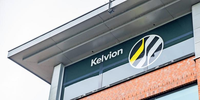 A EWC agreement for the Kelvion Holding was signed at their headquarters in Bochum on 20 December 2017. The group manufactures industrial heat exchangers and until 2014, belonged to the mechanical engineering group GEA, who sold it to a financial investor based on the low-tax Island of Jersey. Since then, the works council has been confronted with relocations and job cuts.
A EWC agreement for the Kelvion Holding was signed at their headquarters in Bochum on 20 December 2017. The group manufactures industrial heat exchangers and until 2014, belonged to the mechanical engineering group GEA, who sold it to a financial investor based on the low-tax Island of Jersey. Since then, the works council has been confronted with relocations and job cuts. A EWC agreement for Yazaki was signed on 18 January 2018 in Bonn. The group manufactures wiring and electrical components and has its European headquarters in Cologne. The 20 representatives in the new EWC represent 25,000 employees in 15 countries with the largest sites situated in Romania, Bulgaria and Slovakia.
A EWC agreement for Yazaki was signed on 18 January 2018 in Bonn. The group manufactures wiring and electrical components and has its European headquarters in Cologne. The 20 representatives in the new EWC represent 25,000 employees in 15 countries with the largest sites situated in Romania, Bulgaria and Slovakia. A European works council has been established for the world largest manufacturer of dental equipment. The EWC agreement was signed in Hanau on 23 February 2018. The group was founded in 2016 following the merger of the US Company, Dentsply and the Sirona group from Austria, the former Dental division of Siemens. As a result of the merger there had been layoffs and job relocations particularly in Germany.
A European works council has been established for the world largest manufacturer of dental equipment. The EWC agreement was signed in Hanau on 23 February 2018. The group was founded in 2016 following the merger of the US Company, Dentsply and the Sirona group from Austria, the former Dental division of Siemens. As a result of the merger there had been layoffs and job relocations particularly in Germany. Central management of the Belgian chemicals group, Solvay and their European works council concluded a charter on 28 February 2018 which acknowledges the skills of company employee representatives. It is the first pan-European agreement of its kind. It has nothing to do with protection against discrimination but expressly with the recognition of skills acquired during the term of office as representative. Meetings with management, negotiations and on-the-job discussions with employees are regarded as standard duties. They should have the same appraisal as the complementary professional skills of non-works council members and lead to pay increases.
Central management of the Belgian chemicals group, Solvay and their European works council concluded a charter on 28 February 2018 which acknowledges the skills of company employee representatives. It is the first pan-European agreement of its kind. It has nothing to do with protection against discrimination but expressly with the recognition of skills acquired during the term of office as representative. Meetings with management, negotiations and on-the-job discussions with employees are regarded as standard duties. They should have the same appraisal as the complementary professional skills of non-works council members and lead to pay increases. A European declaration for the promotion of equal treatment was signed in a meeting of Schreiber Foods´ European works council in Alcobendas (near Madrid) on 5 April 2018. Schreiber Foods has been present in Europe since 2013 following the acquisition of French food manufacturing plants. The agreement applies to Spain, Portugal, Germany, Belgium, Czechia, Slovakia and Bulgaria.
A European declaration for the promotion of equal treatment was signed in a meeting of Schreiber Foods´ European works council in Alcobendas (near Madrid) on 5 April 2018. Schreiber Foods has been present in Europe since 2013 following the acquisition of French food manufacturing plants. The agreement applies to Spain, Portugal, Germany, Belgium, Czechia, Slovakia and Bulgaria. Australian logistics firm reinforces social standards
Australian logistics firm reinforces social standards The trade union network for John Deere met on 8 and 9 May 2018 for the first time at the US-company´s headquarters in Moline (Illinois). The 30 employee representatives from three continents were welcomed by central management and visited a factory in Iowa. The network for the leading manufacturer of agricultural machinery worldwide was already established in 2012 and holds one annual meeting with amongst others the presence of German works council members. If the central management continues to support such meetings in the future, this could represent the first step towards a recognized World works council.
The trade union network for John Deere met on 8 and 9 May 2018 for the first time at the US-company´s headquarters in Moline (Illinois). The 30 employee representatives from three continents were welcomed by central management and visited a factory in Iowa. The network for the leading manufacturer of agricultural machinery worldwide was already established in 2012 and holds one annual meeting with amongst others the presence of German works council members. If the central management continues to support such meetings in the future, this could represent the first step towards a recognized World works council.
 All green lights are still on for the economy
All green lights are still on for the economy Union Information on Crowdworking
Union Information on Crowdworking A new law for promoting the transparency of pay structures came into force in Germany, in July 2017. It is primarily aimed at helping women to better enforce their rights for the same pay for equal work or work of the same value. The responsible Ministry provides information on their website on the new rights to information, the implementation of company monitoring as well as on the reporting obligations for gender equality and equal pay.
A new law for promoting the transparency of pay structures came into force in Germany, in July 2017. It is primarily aimed at helping women to better enforce their rights for the same pay for equal work or work of the same value. The responsible Ministry provides information on their website on the new rights to information, the implementation of company monitoring as well as on the reporting obligations for gender equality and equal pay. The British trade union, Unite is closely following the debate on the different options and plans for the Brexit on a new website. It presents an analysis of the possible effects on employment, labour law and living standards from an employee perspective. This includes e.g. the announcement of Airbus from 22 June 2018, that it would completely withdraw from the United Kingdom due to the Brexit and transfer 14,000 jobs.
The British trade union, Unite is closely following the debate on the different options and plans for the Brexit on a new website. It presents an analysis of the possible effects on employment, labour law and living standards from an employee perspective. This includes e.g. the announcement of Airbus from 22 June 2018, that it would completely withdraw from the United Kingdom due to the Brexit and transfer 14,000 jobs.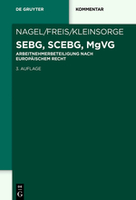 The third edition of a legal commentary on codetermination in the European Company (SE), in the European Cooperative Society (SCE) and on transnational mergers was published in April 2018. There exists a pile of comparable legal literature, but this is the only reference work which has been written from an employee perspective. Apart from a description of the legal subsidiary requirements it also includes typical worked examples from SE participation agreements. Whereas the SE legal form has in the meantime found a broad acceptance (there are currently around 155 SE works councils across Europe), the SCE still remains an absolute exception. One example in Germany is Westfleisch (see
The third edition of a legal commentary on codetermination in the European Company (SE), in the European Cooperative Society (SCE) and on transnational mergers was published in April 2018. There exists a pile of comparable legal literature, but this is the only reference work which has been written from an employee perspective. Apart from a description of the legal subsidiary requirements it also includes typical worked examples from SE participation agreements. Whereas the SE legal form has in the meantime found a broad acceptance (there are currently around 155 SE works councils across Europe), the SCE still remains an absolute exception. One example in Germany is Westfleisch (see  European view of the digital working world
European view of the digital working world Facts and figures from the working world
Facts and figures from the working world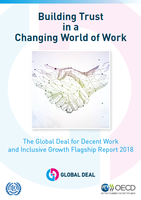 The "Global Deal" Initiative for decent work and inclusive growth published their first flagship report in May 2018. The initiative was started in 2016 by the Swedish government to promote the idea of social dialogue around the globe. This includes the freedom of association and the right to collective bargaining. Besides the OECD and the International Labour Organization (ILO), in the meantime many states, trade unions, companies and non-government organizations have also joined the initiative. In their opinion an effective process of social dialogue contributes to decent work, high-quality jobs, increased productivity, but also to more equality and inclusive growth. The report not only highlights labour relations, but also provides statistical data on collective bargaining in different parts of the world and includes case studies from individual countries and industries.
The "Global Deal" Initiative for decent work and inclusive growth published their first flagship report in May 2018. The initiative was started in 2016 by the Swedish government to promote the idea of social dialogue around the globe. This includes the freedom of association and the right to collective bargaining. Besides the OECD and the International Labour Organization (ILO), in the meantime many states, trade unions, companies and non-government organizations have also joined the initiative. In their opinion an effective process of social dialogue contributes to decent work, high-quality jobs, increased productivity, but also to more equality and inclusive growth. The report not only highlights labour relations, but also provides statistical data on collective bargaining in different parts of the world and includes case studies from individual countries and industries. The chairman of Dana´s European works council visited the plant in Győr (photo) for the first time, on 24 and 25 April 2018. He held discussions with the managing director and HR manager of the Hungarian subsidiary with support from the EWC Academy. The US automobile supplier has four sites in Hungary with nearly 1,000 employees, but so far there is neither a works council nor any EWC representative. During the discussions an agreement was reached on concrete steps to rapidly fill the seats reserved for Hungary in the EWC with democratically legitimized employee representatives. The good economic situation is currently leading to a shortage of manpower and higher workloads in Hungarian factories but is also encouraging double-digit wage increases (see
The chairman of Dana´s European works council visited the plant in Győr (photo) for the first time, on 24 and 25 April 2018. He held discussions with the managing director and HR manager of the Hungarian subsidiary with support from the EWC Academy. The US automobile supplier has four sites in Hungary with nearly 1,000 employees, but so far there is neither a works council nor any EWC representative. During the discussions an agreement was reached on concrete steps to rapidly fill the seats reserved for Hungary in the EWC with democratically legitimized employee representatives. The good economic situation is currently leading to a shortage of manpower and higher workloads in Hungarian factories but is also encouraging double-digit wage increases (see  Principles of corporate governance in the United Kingdom
Principles of corporate governance in the United Kingdom The annual plenary EWC meeting for Ingersoll Rand was held on 4 and 5 June 2018, in Brussels. The conglomerate has 45,000 employees worldwide and is one of the oldest companies in the USA. It manufactures air conditioning systems and machinery, amongst others for the automobile industry. In 2009, the company´s legal headquarters were relocated to Ireland, and as a result the EWC agreement from 2013, falls under Irish jurisdiction. The European works council had already been established back in 1997. The training given by EWC Academy covered in particular the reinforcement of the EWC work and the characteristics of a correct information and consultation procedure.
The annual plenary EWC meeting for Ingersoll Rand was held on 4 and 5 June 2018, in Brussels. The conglomerate has 45,000 employees worldwide and is one of the oldest companies in the USA. It manufactures air conditioning systems and machinery, amongst others for the automobile industry. In 2009, the company´s legal headquarters were relocated to Ireland, and as a result the EWC agreement from 2013, falls under Irish jurisdiction. The European works council had already been established back in 1997. The training given by EWC Academy covered in particular the reinforcement of the EWC work and the characteristics of a correct information and consultation procedure. The European works council of Seiko Epson met on 14 and 15 June 2018 in their European center in Amsterdam and were assisted by the EWC Academy. This manufacturer of computer products has predominantly sales-offices in Europe and the EWC, which was established in 1997, is therefore still relatively small in terms of number of members. For the time being a whole series of countries still have no seat. A few new representatives have recently been elected and the EWC´s work is to be stepped up in the near future. The EWC will be able to build on the cooperative working relationship with central management.
The European works council of Seiko Epson met on 14 and 15 June 2018 in their European center in Amsterdam and were assisted by the EWC Academy. This manufacturer of computer products has predominantly sales-offices in Europe and the EWC, which was established in 1997, is therefore still relatively small in terms of number of members. For the time being a whole series of countries still have no seat. A few new representatives have recently been elected and the EWC´s work is to be stepped up in the near future. The EWC will be able to build on the cooperative working relationship with central management. The EWC Academy and its forerunner organization have been holding conferences and seminars for the members of European works councils, SE works councils and Special Negotiating Bodies since January 2009. So far, 773 employee representatives from 273 companies have taken part including many of them for several times. This represents around 21% of all transnational works council bodies in Europe. This does not include the numerous in-house events and guest lectures given to other organizations.
The EWC Academy and its forerunner organization have been holding conferences and seminars for the members of European works councils, SE works councils and Special Negotiating Bodies since January 2009. So far, 773 employee representatives from 273 companies have taken part including many of them for several times. This represents around 21% of all transnational works council bodies in Europe. This does not include the numerous in-house events and guest lectures given to other organizations. Our annual introduction seminar for the members of European and SE works councils is being organized from 28 to 31 August 2018 in Montabaur Castle not far from the high-speed railway station half-way between Frankfurt and Cologne. For the first time it will not only be given in German but also in English. The following topics are offered in parallel:
Our annual introduction seminar for the members of European and SE works councils is being organized from 28 to 31 August 2018 in Montabaur Castle not far from the high-speed railway station half-way between Frankfurt and Cologne. For the first time it will not only be given in German but also in English. The following topics are offered in parallel: A conference for members of European works councils is being held on 12 September 2018 in Rome (interpreted in English - German - Italian). It will be jointly organized by the Italian Institute SindNova and the EWC Academy. Employee representatives from other countries may participate in an additional seminar on 11 and 13 September 2018 to gain knowledge on Italian industrial relations and on the new government's plans for labour legislation.
A conference for members of European works councils is being held on 12 September 2018 in Rome (interpreted in English - German - Italian). It will be jointly organized by the Italian Institute SindNova and the EWC Academy. Employee representatives from other countries may participate in an additional seminar on 11 and 13 September 2018 to gain knowledge on Italian industrial relations and on the new government's plans for labour legislation.
 Introduction to European labour legislation in Brussels
Introduction to European labour legislation in Brussels